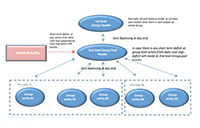Managing diversity in Asia
While Asia is commonly referred to as a region, does this apply to the various countries’ securities markets? Global Custodian spoke to Ee Fong Soh, Managing Director and Head of Securities and Fiduciary Services at DBS Bank in Singapore about securities services in the APAC region.

How does the competitive environment differ market by market in Asia? Is it possible to look at it from a regional perspective?
Asia is a region of countries that are in a similar time zone and there are associations like the ASEAN group of countries where the mandate is to work for the good of the region. Each country has is its own regulations, practices and settlement cut off times. Hong Kong is T+2, Singapore is T+3; some countries even have T+1 for bonds, so each country is different.
DBS as a bank has six core markets: Singapore, Indonesia, India, China, Hong Kong and Taiwan. We are also present in other markets like Malaysia, Thailand, Vietnam and Japan, where we recently received our securities trading licence, so we have a presence in practically every Asian country. From a custody perspective, we’re currently in four of the six target markets: Singapore, Indonesia, India and Hong Kong, and we’re building our China presence to handle QFII and RQFII.
What does that mean for DBS from an organisational point of view? Can you leverage regional expertise in securities market services or does each market require a separate set of service conditions?
In Hong Kong and Indonesia, the bulk of our clients tend to be the domestic investors, such as fund managers and insurance companies. At the same time, they also act as sub-custodians for foreign private or global banks, either directly or indirectly. Sometimes, depending on the client bank’s infrastructure, they may want to have one point of access to Asia. We offer that service out of Singapore, giving them comfort in the jurisdiction of their contractual arrangements and, at the same time, providing access to the services they want in each market. It really depends on each investors’ personal risk appetite and their level of comfort in a particular market.
Our value proposition to our clients is really that we are an Asian bank, very focused on Asia, and we bring the entire bank to the client, not just custody services alone. You can always go to a big global bank and be one of the many or you can come to us and receive a high touch service. I think that's the difference, we are close to the market and are very focused on serving institutional clients; fund managers, insurance companies, and sovereign funds.
We also help other Asian banks access countries where they may not have a presence. When you look at it, other than Japanese and Chinese banks, Asian banks, including Australian banks, tend to be single market banks.
Are there any trends in terms of which client segment is growing fastest either in number or volume of activity?
There are two segments that have grown significantly; one is fund managers, particularly in Hong Kong, Indonesia and Singapore. These are not necessarily the traditional long-only funds that we were used to in the past. Some are long-short, some can be PE-based, and some are focused on specific segments. For example, we have clients who specialise in PE and distressed debt and they know how to distribute really sophisticated clients. We are also seeing more mutual funds in Indonesia, but they are not as diverse in their investment mandates. New funds in Singapore tend to be more focused on alternatives.
Another area where we are seeing growth is private wealth. There are fund managers who are creating funds for the private banks for onward distribution to individuals.
Where do you see the biggest opportunities over the next year?
There are two areas. One is private wealth. I see fund managers still creating funds and investing in Asia, using Singapore as an investment hub. In Hong Kong, growth is around the China play. Despite tougher times, China is still growing at over 6% on a significantly larger economic base than other countries in Asia.
Are there any significant challenges from an operational perspective for international clients?
Investors need to come in with their eyes open. Each market is at a different stage of growth. What international investors are used to in their home market will not necessarily be found in each Asian country.
Singapore is a natural place to use as the entry point for Asia, including China. Because it is quite a diverse region, a central location with a good understanding of the practices, language, culture and infrastructure of the individual markets can help facilitate investment strategies.
(This article was first published in Global Custodian, Fall 2016)
Subscribe to DBS BusinessClass
Stay updated with the latest market trends and industry insights, connect with a network of entrepreneurs, and gain access to exclusive event invitations. Join Asia's fastest growing business community – get your complimentary membership here.




